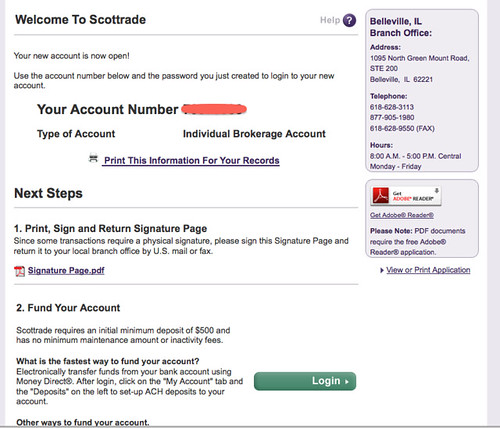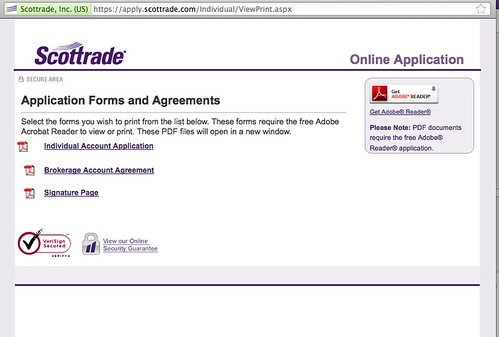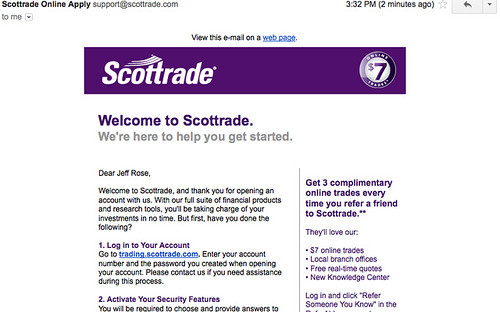
Today I will be BBQ'ing just like every other American family. But memorial day will always have a different meaning for me.
You might think that serving overseas might have something to do with it ' and it does. But that's not the only reason.
It wasn't until several years after returning home that Memorial Day took on a special meaning for me.
The day that I learned SSG Joshua Melton, a father, a husband, a true warrior ' a brother in arms that served with me in Iraq and then volunteered to serve again in Afghanistan ' was killed by an IED while on a mission.
Josh didn't have to do again. Truth be told, I got out of the military after my enlistment was done so that I didn't have to deploy again. There are days that I feel selfish for this decision. As if serving one 16 month deployment wasn't good enough.
Others may consider me a hero, but the true heroes are those like Josh that served, not because they had to ' because they loved their country.
You may know one of these heroes or a family member of these heroes. Take some time today and remember to thank them for the awesome sacrifice they have done.
It's the least we can do.
Never forget.
Now the Carnival of Personal Finance:
The Top Picks of the Week
SB from One Cent at a Time presents A Few Unconventional Ways to Reduce Gas Consumption, and says, 'Some unconventional ways to save money on gas. Simple techniques which any one can follow ranging from enhancing AC performance to adjusting driving speed, find it all.'
Eric from Narrow Bridge Finance presents How to Start Your Own Business with Little Money, and says, 'On Friday night, I had the pleasure of joining Chris Guillebeau and other like minds on the Denver stop of the $100 Startup Book Tour. It was fun meeting people who only knew me as '@DenverEric,' and I enjoyed chatting about world travels and business adventures with a great group of people. Chatting with Chris, I started thinking about the different startup business models popular in the online world today and how to leverage all of them for a great success.'
Philip from PT Money Personal Finance presents Best Long Term Savings: Building a Nest Egg, and says, 'Discusses creating a savings plan for money to be used on a yet-to-be-determined long-term expense. Analyzes it by looking at a few of the major factors: liquidity, return, and risk tolerance.'
Donna Freedman from Frugal Cool presents 'Microjobs': Quick extra cash, and says, 'A number of websites will connect you to one-time or short-term gigs. Some pay surprisingly well. Microjobs aren't just for students, either. Their flexibility make them a good bet for at-home parents, the unemployed or underemployed, retirees who want to bring in a little extra and people who already have jobs but want to earn extra money for specific goals. '
Martin from Studenomics presents One Little Secret That Will Help You Make More Money Freelancing, and says, 'How to make more money right now.'
The Best of the Rest
Russ Thornton from Wealthcare For Women presents 9 Investments Women Should Avoid, and says, 'While there are many resources on the web and in the media telling us which investments we should buy, I've highlighted a list of 9 investments I believe women should avoid.'
Shaun Connell from US Interest Rates presents Should I Pay Off My Mortgage Early?, and says, 'An explanation as to why paying off a mortgage early might not be the most profitable choice in the long-term, but for many ' if not most ' people, it's still one of the best choices possible. A bird in the hand is worth two in the bush.'
Diva from Diva In Debt presents How Much Is Happiness Worth To You?, and says, 'How much is happiness worth to you? Diva in Debt discusses how much she is willing to spend to be happy on a daily basis.'
Roshawn Watson from Watson Inc presents Broke People ' Stop Giving Me Financial Advice!, and says, 'y personal finance journey has lead me to keep others' opinions out of my wallet. Here are 4 reasons to not allow broke people to influence your financial decisions.'
Michael Kitces from Nerd's Eye View presents Why Saving In A Roth (Or Any) IRA Might Be A Bad Idea For Young People After All, and says, 'Allocating savings towards human capital in ways that increase its value or growth rate can actually have far more impact than investments in financial assets; spending $2,000 on classes that produce a $1,000 raise in base salary can, over the next 40 years, generate nearly 20 times the wealth of merely saving the $2,000 in a Roth IRA and growing it for decades!'
Andy from Saving to Invest presents The Business of Being the Best, and says, 'Everyone can study these seven characteristics of success, and learn how to incorporate them into their own lives, and reach greater levels of success.'

Josh's daughter embracing his memorial.
Echo from Boomer & Echo presents Will Your Pension Plan Handcuff You To Your Job?, and says, 'Psychologically, you can be trapped for decades doing something you no longer feel passionate about because of the appeal of maxing out your pension plan.'
Mike from Rewards Cards Canada presents Do You Put Groceries On Your Credit Card?, and says, 'For some people, there's a psychological barrier that exists when it comes to using credit cards for essentials like groceries, gas and pharmaceuticals.'
Miss T. from Prairie Eco Thrifter presents Want to Travel the World for Free? Then Do This, and says, 'Travel isn't just for the wealthy; anyone can travel, even if they have little money to fund their trip. If you dream of travelling to far-off lands, here are 6 ways I have found to travel the world for free; Or at the very least, almost free.'
Lance from Money Life & More presents How To Win Scholarships, and says, 'When I was a college bound high school kid and while I was attending college I made an effort to try to win as many scholarships as possible. It was free money for the most part but you have to spend some time to finding the scholarships and filling out the applications.'
J.P. from Novel Investor presents The Complete Shareholder Proxy Vote Guide, and says, 'As a shareholder, understanding your rights, the proxy voting process and knowing the SEC proxy rules is the best way to stay involved. How you vote could have a direct impact on the company and your money going forward.'
Dave from 6400 Personal Finance presents Lieutenants Should Be Worth $100,000, and says, 'I show how a select group of young American professionals (junior military officers) are setup for financial success the moment they go on active duty'if they take advantage of the opportunity that is.

Eric J. Nisall from DollarVersity presents Stop Being So Obsessed With Saving Every Penny, and says, 'Saving for the future is an oft-neglected aspect of financial planning. Some take it to the opposite extreme and concentrate all their energy on retirement planning. There needs to be a balance in order to avoid regrets and enjoy all aspects of one's lifecycle.'
CCS from Credit Card Smarts presents How Credit Cards Help You Build a Credit History, and says, 'When you use a credit card you are affecting your credit history. Use it wisely and you can build up your credit history with your credit card. See how.
Glen Craig from Free From Broke presents Which Airlines Have Seats Open for Your Rewards?, and says, 'Ideaworks released their annual Switchfly Overall Reward Seat Availability Survey. See which airline miles and points programs faired best.
eemusings from Musings of an Abstract Aucklander presents My worst financial decisions, and says, 'A look back on poor money choices I've made.'
Nicole from Nicole and Maggie: Grumpy Rumblings of the Half Tenured presents Spending for the second baby, and says, 'How much did you spend on baby #2? What kinds of things did you need?'
Bethy from Credit Karma Blog presents 'Duets' ' Money Lessons from Singing Superstars, and says, 'Not only does 'Duets' satiate the hardcore singing competition reality show fans (they're out there, and they're bloodthirsty), but it also shows how successful you can be when you don't go it alone. Let's take a look at a few 'two is better than one' benefits, learned from ABC's new reality show.'
Janet from Credit, Eh presents Don't Fall for these 5 Telephone Scams, and says, 'There are a number of telephone scams out there, and you need to be on the alert. Here are 5 telephone scams to watch out for.'
Jarrod from My Dollar Plan presents Are Paid Surveys a Waste of Time?, and says, 'Paid surveys can be a nice source of extra cash but when do they cross the line into 'waste of time' territory?'
Dividend Growth Investor from Dividend Growth Investor presents How to generate $1000/month in dividends, and says, 'The goal of every dividend growth investor is to create a portfolio which throws off a sufficient stream of income that pays their expenses. As soon as the amount of dividends exceeds the monthly expenses, the investor has reached financial independence.Now that we have the end goal in mind, we have to determine when exactly we need to be able to achieve the target monthly dividend income.'
Jacob @ My Personal Finance Journey from My Personal Finance Journey presents CarMax's MaxCare Extended Service Plan Dissected and Other First-Hand Account CarMax Car-Buying Experiences, and says, 'This post delves into some of the woes of used car buying. Specifically, it outlines and details the Jacobs' first-hand account of a used car buying experience from the popular used car dealership, CarMax. Though the overall experience was positive, there were some major financial 'products' that were pushed that Jacob highly recommends against purchasing. This post details those pitfalls which will help prepare you in your own used car buying experiences.'
Alunda Marks from My Take on Money presents 20 Innovative Ways to Earn Extra Income from Home, and says, 'Alunda at My Take on Money presents, 20 Innovative Ways to Earn Extra Income from Home.'
Josh Champagne from Live Well Simply presents Habits of the Amish, and says, 'The Amish live a life that is pretty far outside the average. Here are some of the habits of the Amish, we can learn from.'
FMF from Free Money Finance presents 30 Steps to Great Finances: Steps 1 and 2, and says, 'Are you overwhelmed thinking about all the work required to get your finances in great shape? Well the good news is that you can do a complete financial overhaul in 30 simple steps. Yep, that's it.'
Bryan from Pinch that Penny! presents Should I Drop Chase Bank?, and says, 'I'm contemplating dropping Chase and going completely online with my banking.'
Tim from Brilliant Finances Personal Finance How To presents Some Tips on Buying a New Car Without Breaking the Bank, and says, 'With so many choices on where to put your money this article discusses the best places to invest.'
Earth and Money from Earth and Money presents Are We an Impatient Society?, and says, 'Yesterday, I was delayed several minutes by a chatty customer in line at the grocery store. Should I have been more patient?'
Odysseas from Wallet Blog presents Are Austria & Luxembourg Hurting American Taxpayers?, and says, 'As evidenced by the recession, personal finance and global finance have become increasingly inseparable. The policies of one country ultimately affect the economies of others, and therefore affect the personal finances of the individual citizens of those countries. So why would anyone approve of a policy that supports tax evasion, promotes criminal activity and adds to economic strain.
Bret from Hope to Prosper presents Following Up on the Facebook Fiasco, and says, 'I posted almost a year ago on why I thought Facebook stock was a really bad investment. Unfortunately for investors, it was even worse than I had anticipated.'
John from Card Hub presents Where's My Experian FICO Score?, and says, 'In a world where knowing your credit score is now instrumental to handling your finances, why is it that Experian keeps you from that knowledge? It's a flawed system when the consumer is denied access to their own financial data.'
Sean from One Smart Dollar presents Teaching Kids the Value of Money, and says, 'An essential part of parenting is teaching your children the value of money from an early age. This will help them out a lot once they are on their own and making their own financial choices.'
Natalie from Debt and the Girl presents What is the price for a (supposed) better future?, and says, 'I hope you like it!'
Dan Meyers from Your Life, Their Life presents How much does it cost to raise kids?, and says, 'We've all heard the eye-popping costs of raising kids (quarter million dollars anyone??). Check out the truth behind these numbers.'

Never Forget
Mr. Money from Smart on Money presents Is Your Portfolio Balanced?, and says, 'If you plan on living a comfortable lifestyle during your retirement years, figuring out a way to save for retirement is essential. Many Americans struggle to find a way to save money for retirement and many of those have trouble making sure that their portfolio is balanced. Without some balance in your portfolio, there's a good chance that you will not be able to get the returns that you need to retire comfortably'
D4L from Dividend Growth Stocks presents 5 Higher-Yielding, Income Growing Tech Stocks, and says, 'When you hear the names Cisco (CSCO), Oracle (ORCL), Apple (AAPL), Microsoft (MSFT) and Intel (INTC), 'dividend stocks' is probably not the first thought to enter your mind. It wasn't that long ago that tech companies simply didn't pay dividends. Every penny earned was plowed back into the business. The entire focus was on growth, and investors were looking for capital gains''
Ray from Squirrelers presents Money Tips for Young People Starting Out, and says, 'It's a good idea to start out on the right foot when it comes to money. This post shares tips for young people just starting out, to help avoid mistakes and make smart decisions that might pay dividends for years to come.'
TTMK from Tie the Money Knot presents Parents and Money: Communication is Key, and says, 'Money discusssions with parents can be awkward, and we might even question some of their decisions anyway. This post explores the topic of parents and money, which can impact us in unexpected ways.'
Mike from The Financial Blogger presents Is The Storm Over Yet? The Tribulation of a Blogger Who Wants to Be a Mogul, and says, 'Is the whole Google storm over with?'
Green Panada from Green Panda Treehouse presents Did You Invest in Facebook? (Should You?), and says, 'Did you get to invest into Facebook?'
Pierre from Intelligent Speculator presents The Facebook 'Fiasco' ' Am I Crazy?, and says, 'What's really happening with Facebook?'
Div Guy from The Dividend Guy Blog presents The Best Source To Get Dividend Stock Picks, and says, 'Where do you get your dividend information?'
Penny Golightly from TotallyMoney presents Easy ways to make a bigger profit on eBay, and says, 'simple tips to make more money when you sell your unwanted items on ebay'
Jason from One Money Design presents Are You Really Getting a Good Deal when Shopping at Outlet Stores?, and says, 'It's important to be a savvy shoppoer when purchasing from outlet stores. Follow these tips to make sure you get a good deal.
Nathan Richardson from ComplexSearch presents What's a Good Credit Score in 2012, and says, 'Because of the mortgage crisis of 2008, many changes were made to creditors anticipation of what is a good score. We've consulted credit experts and came to the conclusion of what is a good credit score.'
Dannielle from Odd Cents presents Why I'm Getting Rid of My Credit Card, and says, 'I explain why I'm getting rid of a credit card that has no benefits.'
Geoff @ Financial Highway from Financial Highway presents RRSP vs TFSA Which is Better?, and says, 'When Canada introduced the TFSA into the mix of registered and non-registered investment accounts, it made an already difficult decision even harder. How do I allocate my investments between my TFSA, RRSP and non-registered accounts? We've prepared a number of examples below to help investors understand the tax treatment of different investment types and the optimal account mix for their portfolio.'
Myself from Life Insurance By Jeff presents Special Risk Life Insurance ' How Special is it?, and says, 'Special risk life insurance is a lot like high risk life insurance, you can get it but you'll wind up paying more than those the insurance companies deem not a risk.'

 Attention, frustrated employees: Start making money on your own. I'll show you how. The following is a guest post from Martin of Start Freelancing Now.
Attention, frustrated employees: Start making money on your own. I'll show you how. The following is a guest post from Martin of Start Freelancing Now. The Chase Sapphire Preferred Credit Card has one of the largest point bonuses available of all travel credit cards. You'll get 40,000 bonus points when you spend just $3,000 in the first 3 months. Those points are worth $400 in cash that you can use to fund a trip. If you decide to take a trip and pay with your points you'll save 20% on the cost, so those 40,000 points become worth $500 in travel when you redeem through Chase's Ultimate Rewards program. You will earn 2 points for every dollar spent on your typical travel and dining categories. All other spending earns 1 point per dollar. There is a $95 annual fee that is waived for the first year.
The Chase Sapphire Preferred Credit Card has one of the largest point bonuses available of all travel credit cards. You'll get 40,000 bonus points when you spend just $3,000 in the first 3 months. Those points are worth $400 in cash that you can use to fund a trip. If you decide to take a trip and pay with your points you'll save 20% on the cost, so those 40,000 points become worth $500 in travel when you redeem through Chase's Ultimate Rewards program. You will earn 2 points for every dollar spent on your typical travel and dining categories. All other spending earns 1 point per dollar. There is a $95 annual fee that is waived for the first year. For starters, you can earn up to 40,000 bonus miles with the United MileagePlus Explorer Credit Card. You get 25,000 points after you first use the card, 5,000 for first use and when you add an authorized user within the first 2 months, and 10,000 points each year when you spend $25,000 or more during the calendar year.
For starters, you can earn up to 40,000 bonus miles with the United MileagePlus Explorer Credit Card. You get 25,000 points after you first use the card, 5,000 for first use and when you add an authorized user within the first 2 months, and 10,000 points each year when you spend $25,000 or more during the calendar year. We've reviewed Chase's Southwest Rapid Rewards credit card in the past. (Read our review.) Even if you take my Southwest Airlines bias away (I love Southwest!), this is a great travel credit card. Why?
We've reviewed Chase's Southwest Rapid Rewards credit card in the past. (Read our review.) Even if you take my Southwest Airlines bias away (I love Southwest!), this is a great travel credit card. Why? How many points can an airline possibly give away? If you open a Chase British Airways Visa Signature Credit Card, you can get as many as 100,000 Avios points for use with British Airways.
How many points can an airline possibly give away? If you open a Chase British Airways Visa Signature Credit Card, you can get as many as 100,000 Avios points for use with British Airways. With the Citi Hilton HHonors Credit Card you get 40,000 bonus points after spending just $1,000 on the card in the first four months of membership. That's enough points to stay 3 nights in a Category 2 hotel (or 1 night in a Category 6). As you might expect you get rewarded more for spending money at the hotel chain. With Hilton HHonors you'll receive 6 points for every dollar spent at Hilton HHonors locations.
With the Citi Hilton HHonors Credit Card you get 40,000 bonus points after spending just $1,000 on the card in the first four months of membership. That's enough points to stay 3 nights in a Category 2 hotel (or 1 night in a Category 6). As you might expect you get rewarded more for spending money at the hotel chain. With Hilton HHonors you'll receive 6 points for every dollar spent at Hilton HHonors locations. Maybe you prefer to stay at Marriott locations. If so, the Marriott Preferred Credit Card is your best option by far. You'll get 50,000 bonus points that can be redeemed for free nights with Marriott, automatic elite status, plus a free night's stay at any Category 1 through 4 hotel.
Maybe you prefer to stay at Marriott locations. If so, the Marriott Preferred Credit Card is your best option by far. You'll get 50,000 bonus points that can be redeemed for free nights with Marriott, automatic elite status, plus a free night's stay at any Category 1 through 4 hotel. Planning a trip to Disney? You'll be glad you got this card. The Disney Premiere Visa is a rewards credit card that stands well on its own: you get 2% rewards for spending at gas stations, grocery stores, restaurants, and most Disney locations. (Other spending earns 1% rewards.)
Planning a trip to Disney? You'll be glad you got this card. The Disney Premiere Visa is a rewards credit card that stands well on its own: you get 2% rewards for spending at gas stations, grocery stores, restaurants, and most Disney locations. (Other spending earns 1% rewards.) If you enjoy staying at Hyatt hotels, the Chase Hyatt Credit Card is a good card to have. You'll get a minimum of 2 nights free after your first purchase. (You can get higher levels of rewards like 2 nights free + 2 suite upgrades or 2 nights in a suite dependent upon your Hyatt status when you open the card). You'll also get one free night credited to you on the anniversary of your card membership. This helps offset the $75 annual fee.
If you enjoy staying at Hyatt hotels, the Chase Hyatt Credit Card is a good card to have. You'll get a minimum of 2 nights free after your first purchase. (You can get higher levels of rewards like 2 nights free + 2 suite upgrades or 2 nights in a suite dependent upon your Hyatt status when you open the card). You'll also get one free night credited to you on the anniversary of your card membership. This helps offset the $75 annual fee. AMEX's Blue Sky credit card offers 7,500 bonus points (which you can redeem for a $100 statement credit) when you sign up for the card. There is no annual fee for this card; a rarity among travel cards. You also get 0% APR for 12 months. The rewards are basic: 1 point for every dollar spent. However, you're also getting access to AMEX's great customer service as well.
AMEX's Blue Sky credit card offers 7,500 bonus points (which you can redeem for a $100 statement credit) when you sign up for the card. There is no annual fee for this card; a rarity among travel cards. You also get 0% APR for 12 months. The rewards are basic: 1 point for every dollar spent. However, you're also getting access to AMEX's great customer service as well. If Starwood properties are more your style, the Starwood Preferred Guest Credit Card is your choice. You'll get 10,000 star points with your first purchase ' enough for a free night at a Category 4 hotel. You also get an additional 15,000 points if you spend $5,000 in the first 6 months. The annual fee of $65 is waived for the first year, too. You get additional credit toward SPG Elite status while also earning 5 points for every dollar spent at Starwood hotels and resorts (2 points on all other spending).
If Starwood properties are more your style, the Starwood Preferred Guest Credit Card is your choice. You'll get 10,000 star points with your first purchase ' enough for a free night at a Category 4 hotel. You also get an additional 15,000 points if you spend $5,000 in the first 6 months. The annual fee of $65 is waived for the first year, too. You get additional credit toward SPG Elite status while also earning 5 points for every dollar spent at Starwood hotels and resorts (2 points on all other spending). One of my goals in mobilizing the Roth IRA movement was that I was hopeful that many young adults would get inspired and, in turn, open up their first Roth IRA.
One of my goals in mobilizing the Roth IRA movement was that I was hopeful that many young adults would get inspired and, in turn, open up their first Roth IRA.


 It's certainly nice to finally put your feet up and relax once you've retired.
It's certainly nice to finally put your feet up and relax once you've retired.







 There is nothing more invigorating than sitting around a dinner table with guests and talking about life insurance.
There is nothing more invigorating than sitting around a dinner table with guests and talking about life insurance.
 Over 90,000 Ford Employees are facing a major decision: What to do with their pension.
Over 90,000 Ford Employees are facing a major decision: What to do with their pension.  I was at lunch the other day with a friend that I hadn't spoken with in years.
I was at lunch the other day with a friend that I hadn't spoken with in years. Having come from a divorced family growing up, I've never been super close to my family.
Having come from a divorced family growing up, I've never been super close to my family. Car insurance- check.
Car insurance- check.